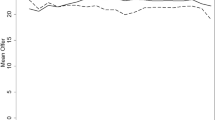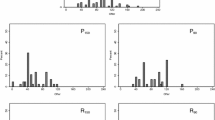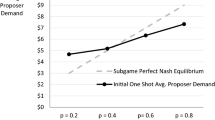Abstract
Focusing on responder behavior, we report panel data findings from both low and high stakes ultimatum bargaining games. Whereas Slonim and Roth (1998) find that offers are rejected fairly equally across rounds in both low and high stakes games, we find that learning does take place, but only when there is sufficient money on the table. The disparate results can be reconciled when one considers the added power that our experimental design provides-detecting subtle temporal differences in responder behavior requires a data generation process that induces a significant number of proportionally low offers.
Similar content being viewed by others
References
Bolton, G. (1991). “A Comparative Model of Bargaining: Theory and Evidence.” American Economic Review. 81, 1096–1136.
Chamberlain, G. (1980). “Analysis of Covariance with Qualitative Data.” Review of Economic Studies. 47, 225–238.
Cherry, T.L. and List, J.A. (2000). “Self-interest in Bargaining Games when Initial Wealth is Earned.” Working paper, University of Central Florida.
Conlisk, J. (1996). “Why Bounded Rationality?” Journal of Economic Literature. 34, 669–700.
Forsythe, R., Horowitz, J., Savin, N.E., and Sefton, M. (1994). “Replicability, Fairness and Pay in Experiments with Simple Bargaining Games.” Games and Economic Behavior. 6(3), 347–369.
Fudenberg, D. and Levine, D. (1997). “Measuring Players' Losses in Experimental Games.” Quarterly Journal of Economics. 112, 507–536.
Guth, W., Schmittberger, R., and Schwartz, R. (1982). “An Experimental Analysis of Ultimatum Bargaining.” Journal of Economic Behavior and Organization. 3, 367–388.
Hoffman, E., McCabe, K.A., Shachat, K., and Smith, V.L. (1994). “Preferences, Property Rights and Anonymity in Bargaining Games.” Games and Economic Behavior. 7(3), 346–380.
Hoffman, E., McCabe, K.A., and Smith, V.L. (1996a). “On Expectations and the Monetary Stakes in Ultimatum Games.” International Journal of Game Theory. 25(3), 289–302.
Hoffman, E., McCabe, K.A., and Smith, V.L. (1996b). “Social Distance and Other-Regarding Behavior in Dictator Games.” American Economic Review. 86(3), 653–660.
List, J.A. and Lucking-Reilly, D. (forthcoming). “Demand Reduction in a Multi-Unit Auction: Evidence from a Sportscard Field Experiment.” American Economic Review.
List, J.A. and Shogren, J.F. (1998). “Experimental Calibration of the Difference Between Actual and Hypothetical Reported Valuations.” Journal of Economic Behavior and Organization. 37(2), 193–205.
Roth, A.E. and Erev, I. (1995). “Learning in Extensive-Form Games: Experimental Data and Simple Dynamic Models in the Intermediate Term.” Games and Economic Behavior. 8, 164–212.
Author information
Authors and Affiliations
Rights and permissions
About this article
Cite this article
List, J.A., Cherry, T.L. Learning to Accept in Ultimatum Games: Evidence from an Experimental Design that Generates Low Offers. Experimental Economics 3, 11–29 (2000). https://doi.org/10.1023/A:1009989907258
Issue Date:
DOI: https://doi.org/10.1023/A:1009989907258




